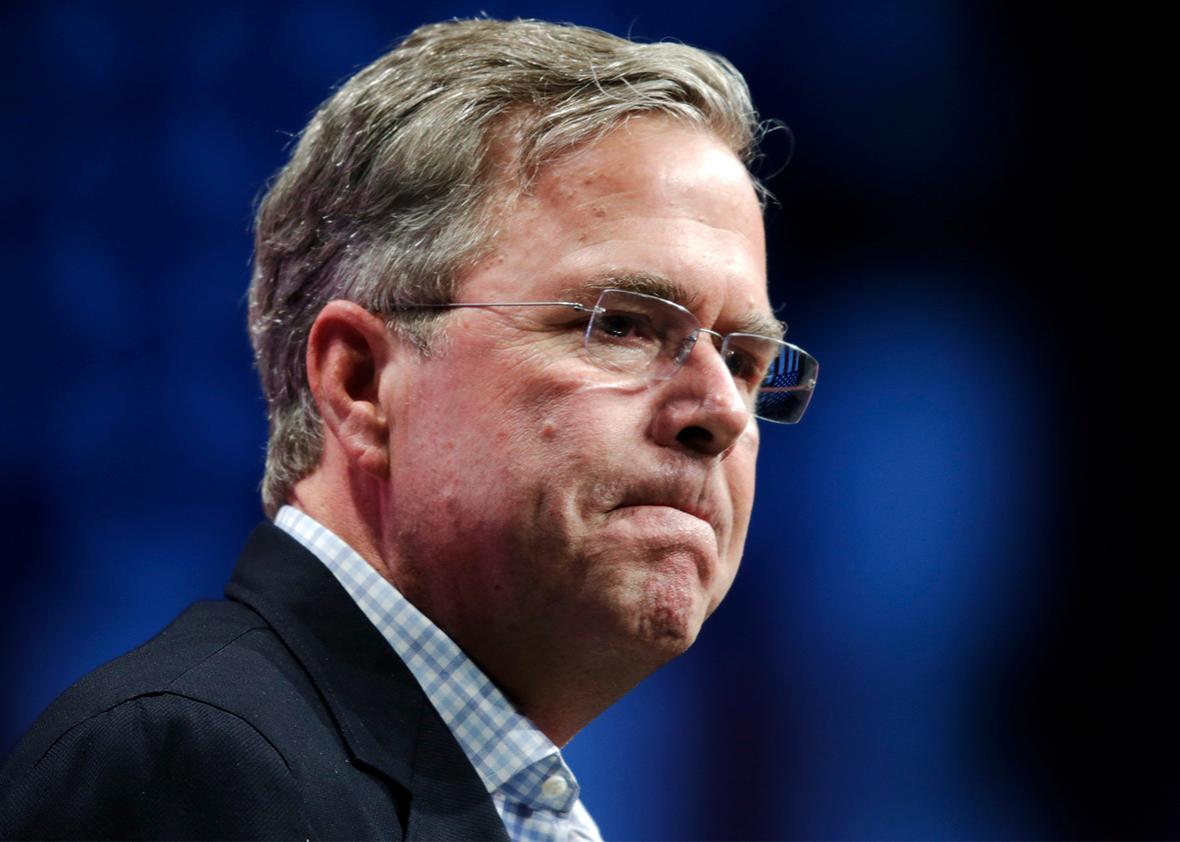It is not difficult to see why Jeb Bush is losing this presidential election. He is the wrong man in the wrong cycle. Republican primary voters are rewarding passionate, fiery, outsider, “anti-establishment” candidates who paint their visions in broad strokes rather than pesky details. Bush is the very picture of a Republican establishment and his donors the very image of donor-class Republicanism. Though he claims not to be “an expert on the ways of Washington,” he is vying to be the third consecutive Republican president named Bush. He is a conservative technocrat animated less by angst and more by, say, education funding models. Anti-immigration sentiment is dominating this primary, and immigration has long been Bush’s chief weakness in the primary. He’s a bad fit for the 2016 Republican Party, and barring some deus ex machina that switches every current coursing through the Republican primary electorate, he will soon have little rationale for continuing his run.
What’s more difficult to figure out, though, is why Republican primary voters seem to dislike the guy so much. It’s one thing not to support Bush’s candidacy or not to respond to his style of politics. It’s another to act as though the man personally beat up you and your entire family and then stole your television. And your dog.
Gallup is not polling horse-race preferences this year, but it is still measuring candidate favorability. And it finds Bush’s favorability so poor that it’s published a lengthy post that can best be summed up as OMG you guys, check out how much they dislike Bush! Bush’s net favorability rating, according to Gallup’s two-week rolling average, for the first time sits in negative territory at -1, with 44 percent viewing him favorably to 45 percent unfavorably. That would be a so-so figure if the sampling included the full spectrum of Republicans, Democrats, and Independents. Barack Obama, for example, has been camped out in such a position for years. But this just measures Bush’s figures among Republicans and Republican-leaning independents. It is the lowest net figure among the nine candidates Gallup measures. Gov. John Kasich, who has run a campaign strategy of loudly telling conservatives to cut the crap, is second-worst with a +5 rating. The other seven candidates’ net favorability ratings range between +23 and +45. It’s not that Bush’s number is staying flat, either. He is trending downward, from +27 in mid-July to this current, lowly state.
Let’s look at New Hampshire, where Bush and his super PAC have been expending vast amounts of time and money. There is some sign that the onslaught has worked, according to Public Policy Polling’s most recent survey, but it’s not nearly enough. “Bush has gone from negative territory last month (38/45) to positive ground (44/42),” PPP writes. “It may not sound like much but it’s been a long time since we found Bush with an above water favorability anywhere.” The +2 is still well below the net ratings in the state for Bush’s rivals in the establishment lane, Sen. Marco Rubio, Gov. Chris Christie, and Kasich. And Bush’s campaign and super PAC combined have spent $23 million in New Hampshire on advertisements, mostly devoted to improving Bush’s image rather than attacking rivals.
Bush has a -24 favorability rating, with 29 percent viewing him favorably and 54 percent viewing him unfavorably, among voters of all stripes. That makes sense. Democrats dislike Bush because he is a Republican and the brother of George W. Bush, whom Democrats view as a very poor president.
When I’ve seen Bush address conservative audiences, he gets the reception you might expect from Republicans who may have appreciated his work in Florida and think the dude himself is alright but aren’t excited about his presidential candidacy. He’s comfortable fielding questions and answers them well enough, to mostly conservative satisfaction and to polite applause. There’s no animus or tomato-chucking. Maybe they just have good manners in public.
Is it the immigration thing? Bush and Rubio have roughly the same history and position on immigration, but Republican voters view Rubio very favorably, even if his actual polling numbers haven’t correlated to his satisfaction. Is it the establishment ties? Christie is a more moderate candidate who’s viewed quite flatteringly by Republican Wall Street donors, but his favorability numbers have turned around dramatically over the last few months. Is it the last-name thing? There may be more to this, since few voters of any kind are especially excited about the coronation of a third Bush. But George W. Bush is remembered fondly enough among Republican voters that there’s now chatter about how bringing out the former president might be the best and only way to save Jeb’s campaign.
Maybe it’s unfair that voters despise Bush in a way that seems … disproportionate to the man himself. But turning his favorability around is the first order of business before the real business of markedly improving poll numbers can be discussed. And it is already Jan. 8.
